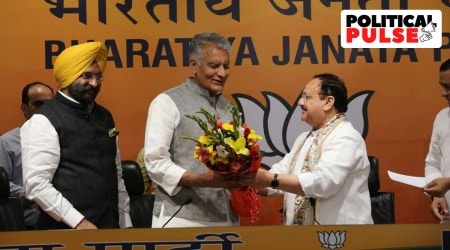[ad_1]
India’s proposal India’s proposal before a United Nations (UN) ad-hoc committee to adopt measures similar to the controversial — and now defunct — Section 66A of the Information Technology Act, 2000, for introducing domestic legislation in member countries to categorise “offensive messages” through “communication devices” like social media as ‘offences’, has so far failed to garner support of any nation.
Delegates from the European Union, the United Kingdom, Georgia and Luxembourg have opposed the country’s proposal for being violative of the right to speech, members attending the UN’s convention said. In 2015, the Supreme Court had struck down the particular section, calling it “unconstitutional”.
Buy Now | Our best subscription plan now has a special price
A delegation from India is currently at the second session of the UN-organised international convention on countering the use of information and communications technologies for criminal purposes in Vienna. The Indian delegation includes officials from the External Affairs, Home and IT Ministries. Set up by the terms of a UN General Assembly (UNGA) resolution approved in May 2021, the ad-hoc committee is supposed to submit a draft convention on countering cybercrime to the General Assembly’s 78th session in 2023-24. If passed, it will then be legally binding on all member nations of the committee.
One of the Indian delegation’s proposals to the committee is essentially a word-by-word copy of Section 66A of the Information Technology Act (IT Act) – the Indian delegation has essentially suggested that all member nations of the committee introduce offences in their respective domestic legislation for sending “offensive messages” through a computer resource or social media platforms.
In a landmark judgment in 2015, the Supreme Court had struck down Section 66A of the IT Act, calling it unconstitutional for “being violative of Article 19(1)(a) and not saved under Article 19(2)” of the Indian Constitution. Article 19(1)(a) gives people the right to speech and expression whereas Article 19(2) accords the state the power to impose “reasonable restrictions” on the exercise of this right. The provision was criticised for being misused by law enforcement agencies over the vagueness of what was considered to be “offensive”. However, despite the ruling, a number of instances have surfaced since where various state police departments have booked people under the now defunct provision.
Ad-hoc panel
Set up by the terms of a UN General Assembly (UNGA) resolution approved in May 2021, the ad-hoc committee is supposed to submit a draft convention on countering cybercrime to the General Assembly’s 78th session in 2023-24. If passed, it will then be legally binding on all member nations of the committee.
According to delegates at the committee’s ongoing convention, India’s proposal has been met with opposition by major members. The EU opposed India’s suggestion, saying that it is an “infringement on the freedom of expression and would therefore not constitute a universally recognised relevant offence for others”. On similar lines, the UK delegation said that there was not “sufficient justification” for considering the proposal that “risks infringing rights of expression”. Delegates from Georgia and Luxembourg too took a similar stance. El Salvador said that its domestic rules only apply to offensive messages which can pose a risk to children, while Nigeria said it only has civil remedies for such an offence and not criminal ones.
So far, no country has supported India’s proposal on creating offences in domestic legislation for sending “offensive messages” through a communication service – in particular, the delegation from Russia said that it needed more time to think about India’s proposal, and China did not engage with the proposal at all, according to delegates at the convention.
Queries sent to MEA, MHA and MeitY were unanswered until the time of going to press.
According to a senior government official, the Indian delegation has floated the proposal “to gauge the global consensus on the idea of penalising objectionable content on social media”. “We wanted to tell the UN convention that we used to have a law which penalised such content. The issue Section 66A ran into was of misuse. Our aim is that after deliberation among the various member nations, we can possibly reach a consensus on how the provision could be made better,” the official said on condition of anonymity.
!function(f,b,e,v,n,t,s)
{if(f.fbq)return;n=f.fbq=function(){n.callMethod?
n.callMethod.apply(n,arguments):n.queue.push(arguments)};
if(!f._fbq)f._fbq=n;n.push=n;n.loaded=!0;n.version=’2.0′;
n.queue=[];t=b.createElement(e);t.async=!0;
t.src=v;s=b.getElementsByTagName(e)[0];
s.parentNode.insertBefore(t,s)}(window, document,’script’,
‘https://connect.facebook.net/en_US/fbevents.js’);
fbq(‘init’, ‘444470064056909’);
fbq(‘track’, ‘PageView’);
[ad_2]
Source link





